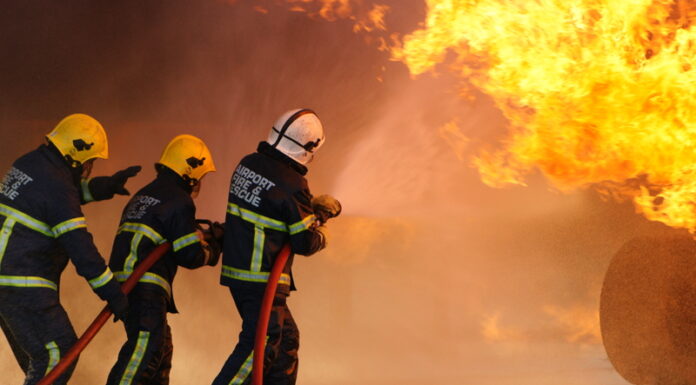Passengers aboard an American Airlines Boeing 737 were evacuated onto the plane’s wing on March 13, 2025, due to an engine fire at Denver International Airport, Colorado.
The Federal Aviation Administration (FAA) stated, “American Airlines Flight 1006 diverted to and landed safely at Denver International Airport around 5:15 p.m. local time on Thursday, March 13, after the crew reported engine vibrations. After landing and while taxiing to the gate, an engine caught fire, and passengers evacuated the aircraft using the slides.”
Witnesses and passengers’ video footage captured flames from the right engine, necessitating the deployment of emergency slides. Some passengers exited onto the wing as smoke enveloped Terminal C, gate C38.
The airline reported 12 passengers sustained minor injuries, were treated at local hospitals, and subsequently released.
Alexandria Cullen, an aide for Colorado Congressman Gabe Evans, mentioned her mother was among the 172 passengers. “My mom was on this flight. THANK YOU GOD that they are alive,” Cullen posted on social media.
A bystander described the scene as “nerve-wracking, terrifying, and horrific,” underlining the anxiety experienced by those present.
American Airlines confirmed the evacuation of 172 passengers and six crew members, who were then escorted to the terminal. The airline expressed its gratitude for the swift actions of its crew, Denver staff, and first responders.
Concerns arose over emergency response protocols as no fire crews were initially on site when the plane landed. Aviation experts noted this was because a formal emergency was not declared, despite the reported engine vibrations that later escalated to a fire.
Investigators are assessing potential causes for the engine fire, such as a punctured fuel line or mechanical failure. The National Transportation Safety Board (NTSB) has dispatched a team to investigate the aircraft, interview involved parties, and collect data. A preliminary report is anticipated within 30 days, with a final determination expected in 12-24 months.
This event adds to recent aviation safety concerns following incidents in Toronto, Canada; Alaska; Philadelphia, Pennsylvania; and near Washington, D.C., alongside similar engine problems with a United Airlines flight in Houston, Texas, and a FedEx cargo plane in New Jersey.
On March 17, 2025, another American Airlines flight reported engine issues. Flight 1603 from Miami, Florida, to Guatemala City returned to Miami International Airport after takeoff when witness Jake Fletcher reported hearing an explosion and seeing flames from an engine.
“Take a long, hard look at what’s going on with their airplanes,” Fletcher remarked, expressing concern about the two incidents occurring in quick succession. Despite these occurrences, experts assert that air travel remains among the safest transportation modes.
Dr. Hassan Shahidi of the Flight Safety Foundation commented, “In 2024 we had a billion people travel by air in the U.S. Thousands of airplanes depart and land every day, with trained pilots and air traffic controllers who are doing their jobs well. But that said, there are concerns.”
Dr. Daniel Adjekum, an aviation safety management expert with over 20 years of experience, warned against potential staffing cuts in the industry, stating, “This is not a time to be cutting stuff and to be laying people off.”
Aviation safety data indicates that there were 1,417 aviation accidents in the U.S. in 2024, 258 of which were fatal. In 2025, 99 accidents occurred, 14 of which were fatal. These numbers are a decrease from previous decades, but pilot error (53%), mechanical failure (21%), and weather (11%) remain primary contributors.
Denver International Airport returned to normal operations following the incident, with the affected gate reopening the next day.








